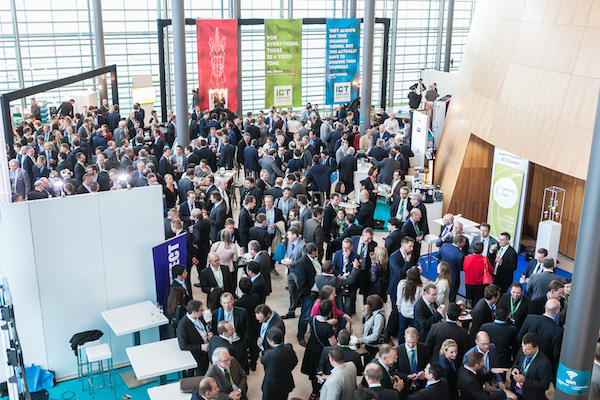
This past Tuesday and Wednesday, 19 and 20 May, 5,300 people participated in the sixtth edition of ICT Spring Europe – the biggest yet to date – at the New Conferences Centre in Luxembourg-Kirchberg, with local and global ICT giants, six Korean companies, four Japanese, and numerous local and international start-ups making up the bulk of exhibitors on hand, as well as a host of both locally and internationally-renowned guest speakers (around 100), and two government Ministers, who explored pertinent subjects in the sector – namely the future of digital with a strong emphasis on Fintech.
By the end of the first hour of the conference, some 2,000 tweets had already been sent out, and this trend continued up until the end of the second and last day of the event.
The conference’s major talking point was the development of financial technology – bank transactions, security in finance etc. Luxembourg’s Minister of Finance, Pierre Gramegna gave a presentation, “The Fintech Revolution: what it means for Luxembourg”, and pinpointed that “the speed and security of transactions will determine the banking business of the future”. He presented Luxembourg as future centre of Fintech and stressed that the number of people in the world with a bank account has grown from 51% to 62% since 2011. He concluded by saying that this net growth was direct consequence of the development of Fintech and mobile communication.
His government colleague, Claude Meisch, the Minister of National Education echoed these thoughts, when presenting the Digital (4) Education strategy to be adopted in the Luxembourg education system. He stressed that the system was going to transform itself in the next two years, saying: “This [new strategy] will ensure the modernity of Luxembourg’s future generations in the digital age”.
Tom Theobald, Assistant General Director of Luxembourg For Finance, commented that technological innovation was essential for the future development of the financial industry. He reiterated that Luxembourg has become a platform for Fintech in the heart of continental Europe and with a growing number of companies established here in the Grand-Duchy, either targeting the local financial sector and establishing a clientele base, or developing their international activities. He added that the impressive number of visitors and participants at ICT Spring 2015 was proof of the increasing appeal that Luxembourg holds as a Fintech hub, and that the conference/exhibition was an ideal opportunity to listen to important personalities of the industry speak and to exchange ideas with innovators from all around the world.
Lawyer and Member of the UN Commission on Broadband for Digital Digital Development, Jean-Louis Schiltz, was categorical in describing the event as “the most important in the information technology sector in Luxembourg, with a strong international presence – a true spectacle with a focus on Fintech.”
In 2014, around £12 billion were invested in Fintech. Approximately 80% of that amount went into the US, and only 15% in Europe. A study by consultancy firm Accenture highlighted that Fintech was the fastest-growing market in Europea, with countries like the Netherlands, Germany and Nordic nations interested in dipping their feet into it. The current centre is at Accenture London, with 1,500 start-ups and thirty-six incubators.
Accenture has also, at the same time, revealed a weakness in the banking sector. Only 70% of European banks have an innovation strategy, albeit a fragmented one. 80% of banks possess only minimal equipment for the digital age, meaning that the extraordinary growth predicted in the European banking, is in fact catch-up growth.
ICT Spring Europe displayed a wide variety of exhibitors, with fascinating demonstrations for participants. Among some of the highlights were Lux-drones and Bionic Bird – which each had flying demos of their products, PLG’s 3/4-D Oculus Rift – a virtual reality platform, Aldebaran Robotics - with life-sized robots, who carry out commands and orders, and Nippon Control System Corp’s Gesture Recognition Engine Environment (GREEEN), which offers new touch-less user interface, operable by gestures like hand movements.
Photos by Olivier Dessy (above), Hugo Fulco (below)








